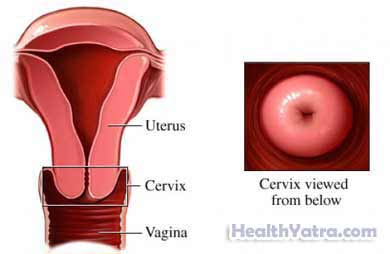Definition
The cervix is the opening to the uterus (womb). The cells on the cervix can become cancerous. Changes detected early can be treated before cancer develops. A Pap test is a way to look for changing or cancerous cells on the cervix.

Reasons for Test
A Pap test is often done as part of a pelvic exam. It is done to check cervical cells for changes ( cervical dysplasia) that could develop into cancer. It can also detect cancer cells.
Talk to your doctor about when you should have Pap tests done. Professional health organizations have differing guidelines.
- If you are age 21-29 years, you should have the Pap test every 2-3 years.
- If you are age 30-65, you should have the Pap test along with the HPV test every 3-5 years.
- If you are age 65 or older, you may be able to stop having Pap and HPV tests if you have had normal results (such as, three normal results in a row and no abnormal results in the past 10 years).
- Note: You will need to have Pap tests done more often if you have abnormal results. You may also need more frequent testing if you have certain conditions, like a suppressed immune system or a history of cervical dysplasia or cervical cancer. Talk to your doctor about the right screening schedule for you.
Possible Complications
There are no major complications associated with this test.
What to Expect
Prior to Test
- Do not schedule the Pap test during your menstrual period. If possible, schedule it two weeks after the first day of your period.
- Do not use vaginal creams, medicines, or douches for 72 hours before the test.
- Do not use contraceptives such as spermicidal foams, creams, or jellies for 72 hours before the test.
- Do not have sex for 24 hours before the test.
Tell your doctor if you:
- Are having your period
- Are pregnant
- Have had a previous Pap test showing abnormalities
- Have had any cervical procedures, like loop electrosurgical excision procedure (LEEP)
- Are sexually active
- Have been exposed to HPV or other sexually-transmitted diseases
- Have had abnormal vaginal discharges or vaginal infections
- Have had surgery, radiation treatment, or chemotherapy
- Are taking birth control pills , hormone pills, or using hormone cream
Description of Test
You will lie on your back on an examination table. You will place your feet in foot rests. The doctor will insert a speculum into your vagina. It will gently open your vagina. A fine brush or spatula will be used to wipe the surface of the cervix and its canal. The speculum will be removed. The cervical cells that stuck to the tools will be placed in a fluid-filled bottle. The cells will then be sent to a lab for testing.
How Long Will It Take?
The pelvic exam takes less than five minutes.
Will It Hurt?
A Pap test is generally painless. You may feel some pressure or a small cramp when the cervix is wiped to gather cells.
Results
The results of your Pap test are sent to your doctor within 2-3 weeks. Your doctor will inform you of the results. If needed, she will talk to you about follow-up testing or treatment.
- If cells are normal, no treatment is needed. You will continue your regular Pap test screens.
- If an infection is found, treatment will be prescribed.
- If cervical abnormalities are found, further tests will be done. When your doctor determines the cause, she will discuss treatment options with you. Further tests may include:
- Colposcopy —examination of the vagina and cervix with a low-power microscope
- Biopsy —removal of a small amount of cervical tissue for further testing
- Follow-up Pap tests
Call Your Doctor
After the test, call your doctor if any of the following occurs:
- Signs of infection, including fever and chills
- Foul vaginal odor, pain, or unusual vaginal discharge
- Severe abdominal pain or swelling
In case of an emergency, call for medical help right away.
